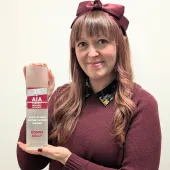Cambridgeshire County Council choose Low-Temperature Asphalt

First published in the January 2017 issue of Quarry Management as A Viable Alternative
Specification of low-temperature asphalt for refurbishing roads is likely to become the default position of Cambridgeshire County Council, following successful trials in 2016
Cost savings come into the equation when deciding whether to use low-temperature asphalt (LTA), as do longer service life expectancy, a quick turn round of work and less disruption to motorists. Then there are the well-charted environmental benefits that include less energy use, fewer emissions and safer working. So, what is there not to like about LTAs?
‘Nothing’, confirms Cambridgeshire County Council’s head of highways, Richard Lumley, who, having gauged the benefits of LTA for himself after trials in his county, says he has become much less likely to specify hot mixtures without good reason to.
‘It now seems to me that lower-temperature mixes can be a viable and beneficial alternative to hot mix in most circumstances,’ he said. ‘There were no negative signs,’ he added, referring to the trials of LTA that were carried out by Cambridge CC in partnership with its highway term maintenance contractors Skanska and asphalt suppliers Aggregate Industries.
‘I don’t see why hot materials need to be specified other than in extreme conditions. I can see LTAs becoming the default choice of Cambridgeshire when we specify asphalt for road maintenance in the county.’
LTAs have been available in Britain for a considerable time but their uptake has been slow despite good environmental credentials – higher cost in comparison with hot mix has tended in the past to outweigh the green benefit in particular of reduced carbon impact. But lately, as alluded to at the top of this article, there has been a growing appreciation of the extended service life and concomitant whole-life cost savings of LTAs, plus a range of distinct practical benefits.
It is now clear that some LTAs, mixed and placed at temperatures perhaps 30°C to 40°C less than hot mix, can be laid rapidly, compacted well and trafficked much more quickly than hot mixtures. This reduces the cost of traffic management, for instance, and also disruption to the travelling public. Road closures are minimized and diversions often avoided. Then there is the reduced oxidative hardening and bitumen ageing that is a characteristic of LTAs: there is an expectancy of longer pavement life when an LTA is used. The savings can add up for a county council under pressure to cut costs.
‘The benefits are not to be sniffed at,’ said Mr Lumley. ‘It was the potential savings that concentrated my mind on doing things differently. We have to look at ways to cut costs here and have the support of Council members to explore new products and ways of working. Hence the trials of LTA.’
The trials that involved Aggregate Industries took place during March 2016 along Highfields Road in Caldecote, a village 10km west of Cambridge. Running through an urban area, the single-carriageway road has numerous side roads and mini-roundabouts, and the work had to be done under off-peak daytime lane closures – although access had to be provided at all times for live traffic. The laying of surfacing 50mm thick, following the planing out of a similar depth of existing material, took place over five days. According to Mr Lumley, daily productivity was affected by the laying logistics, not the material.
He confirmed that the material produced by Aggregate Industries – the company’s Superflex surface course which uses a purpose-produced Nytherm binder from Nynas (see below) – went down well with good workability even at lower production and delivery temperatures. ‘The running surface is excellent, the more so when you consider the very fast road opening that was achieved after every tranche of work.’
Inspections of the LTA at Highfields Road are currently limited to visual inspection employing video surveying techniques, although Mr Lumley stated that further investigation will take place if any visually identified issues emerge. ‘So far there have been no issues,’ he said. ‘The trials were based around the LTA version of the widely used HAPAS for surface course materials, so we don’t expect to experience any material design related failure, particularly based on the testing that was carried out during construction.’
Keeping a watch on performance will be the pavement forum held by Cambridgeshire County Council on a regular basis. The forum includes colleagues from Mr Lumley’s department, Skanska, Atkins (who supplied specialist material and pavement design support to the trials) and supply chain representatives. ‘The forum is intended generally to improve the processes we use, to look at materials development and so on.’
Richard Lumley has declared himself well satisfied with the Aggregate Industries trials. ‘I’m impressed by the contractor’s lower-temperature material. Anything which saves us money has to be a good thing and this combined with less disruption when the asphalt is being put down, plus the fact that when it’s down, it’s down for a good period of time, makes LTA attractive to us. It’s more and more likely we’ll be specifying the material in the future. As I said, it could well become the new default material specified for highway maintenance.’
Superflex surface course
Cambridgeshire County Council’s trial of low-temperature asphalt (LTA) on Highfields Road took place in the spring of 2016 during wet and windy weather. The mixture trialled was Aggregate Industries’ proprietary asphalt surfacing Superflex, produced at the company’s Peterborough asphalt plant at between 30°C and 40°C below normal mixing temperature. Some 1,100 tonnes of Superflex was laid 50mm thick, over five days.
‘The extended time period was because we had restricted access and had to keep [the road] open to traffic,’ said Aggregate Industries’ national technical manager (aggregates/asphalt), Philip Sabin. ‘The ‘bitty’ nature of the project clearly demonstrated the advantage of lower-temperature material in enabling fast road opening.’
Aggregate Industries’ Superflex contained a specially selected version of Nynas’ Nytherm PMB binder, a warm-mix polymer-modified bitumen. Emphasizing the point that the Nytherm range offers clients other performance benefits in addition to a reduction in energy use, Nynas’ UK technical support manager, Dennis Day, said: ‘The use of warm-mix polymer-modified bitumens, such as Nytherm PMB, is on the increase as it allows early opening to traffic and completion of contracts, as clearly demonstrated by Aggregate Industries’ project in Cambridgeshire.’
Prior to the Highfields Road trial, Aggregate Industries invited members of both Cambridgeshire County Council and Peterborough City Council, plus representatives of term maintenance contractors Skanska, to workshop discussions about Superflex, specifically on the technology, handling and performance expectations of the material. ‘This was to address any possible issues of concern about using LTA. In the event, nobody was disappointed in the trial results,’ said Mr Sabin.
‘While Superflex is not HAPAS approved, it is a long-established proprietary asphalt surface course product with more than 20 years of successful use behind it,’ he concluded.
- Subscribe to Quarry Management, the monthly journal for the mineral products industry, to read articles before they appear on Agg-Net.com








